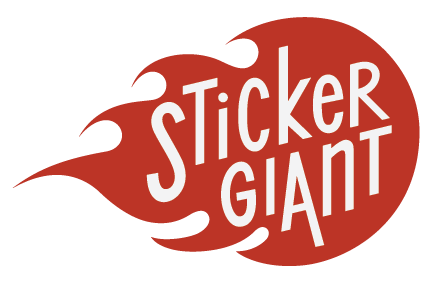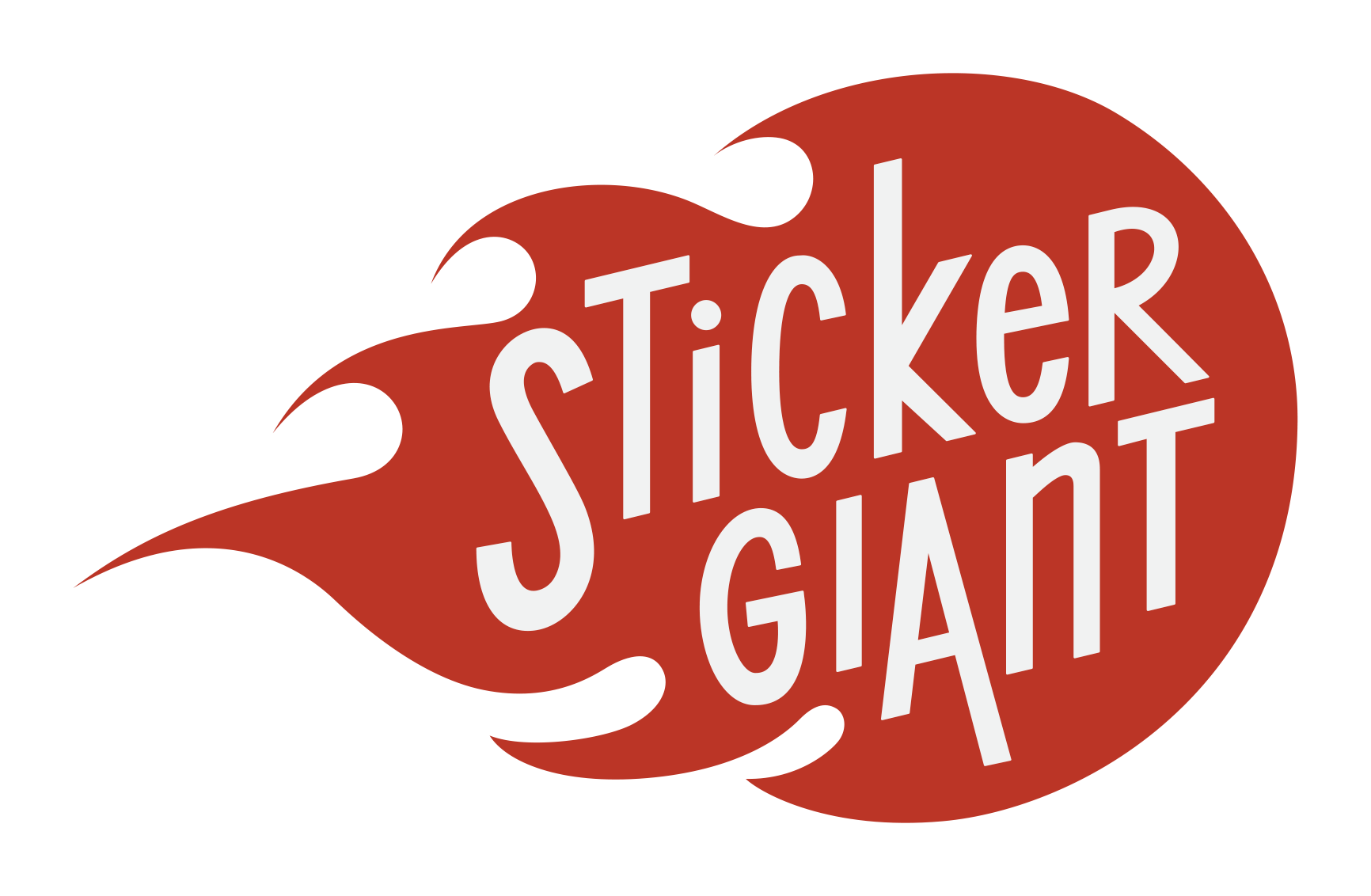Stickers on the Mic
A Podcast about Business, Growth, and Marketing
Welcome to the Stickers on the Mic Podcast, where we talk about the stories behind the custom stickers and labels that we print. We focus on business, and specifically marketing for small businesses.
We invite our customers onto the show to talk business, growth, and of course, stickers and labels. Currently, Stickers on the Mic is in its seventh season of sharing customer stories and profiling the amazing businesses that we work with.
FEATURED EPISODE
John Clinton Creates Designs That Embody The Spirit Of Colorado
Join us in our latest podcast episode as we host John Clinton, the creative mind behind ColoradoCool Apparel. Born out of passion and a relentless desire to be different, ColoradoCool Apparel is the brainchild of a designer who's always looking to push boundaries and create designs that embody the spirit of Colorado.
Growing up in Colorado, John's love for the great outdoors and the state's vibrant culture always found a way into his art. It was this consistent theme in his designs that birthed the idea of ColoradoCool Apparel. From its humble beginnings as a personal project to improve his design skills, it has evolved into a brand that's all about celebrating Colorado's unique lifestyle.
ColoradoCool Apparel is more than just a brand - it's a growing community of Instagram brand ambassadors across Colorado and the globe who resonate with the brand's designs and lifestyle, giving life and meaning to ColoradoCool. The brand is all about its people, those who love Colorado and the lifestyle it promotes.
And as the brand continues to grow, John is committed to giving back to the Colorado community. Whether it's investing in environmental preservation or providing gear to those less fortunate, ColoradoCool Apparel is all about embracing and enhancing the Colorado lifestyle.
Tune into this episode to hear more about John's journey in creating ColoradoCool Apparel, how he challenges the norms of design, and his vision for the future of this unique brand. Check out this inspiring episode anywhere you get your podcasts.


Joshua Mehzer tried to germinate his first cannabis seed while in high school, after attending one of the early public protests in the UK to decriminalize cannabis in the year 2000. Shortly after moving to the USA in 2010, he found himself dropping out of the University of Santa Cruz to grow medicinal cannabis full-time. Since then he has grown cannabis hydroponically, aeroponically, soil medium, indoors, and outside in greenhouses and full sun. He developed the world's 1st pair of smart electric scissors for timing cannabis and has participated at all levels of the industry. His love of plants goes back to an early age, but cannabis is his favorite and he has grown a lot of it.
He started A Pot for Pot and A Pot for Plants to empower people to grow their own plants and to combat the stigma that pot is difficult to grow.
He's been approached by countless amateur home hobbyists who would like to start a small personal grow, but don't know where to begin. They're overwhelmed with information, and think there must be some secret sauce to growing great plants. He created a kit so anyone can grow their own clean, plants at home. Everything needed is in the box. Just add water, seed, and sun. The simple directions take customers through the process step-by-step, and make it easy to grow their own natural herbs right on their desk or balcony, or in their living room or home garden.
You can also watch the episode on YouTube.
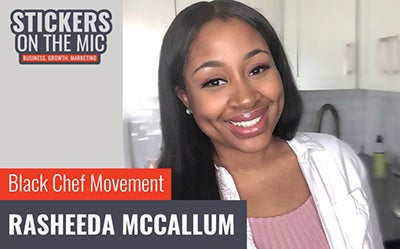

The Black Chef Movement was inspired by activists and Black and brown communities stepping up to fight social injustice. Disturbed by civil unrest and the inequities in urban communities, Executive Director and chef Rasheeda McCallum used her love of food and passion for justice to create the Black Chef Movement. BCM works to create a network of Black and brown chefs together to provide healthy and nourishing meals to folks in need of mutual aid. In just three years, BCM has grown to include nearly 250 volunteers and has fed thousands of activists and families across New York State.
Black Chef Movement aims to counter food injustice in urban communities and shine a light on chefs of color. Unfortunately, urban communities are often the center of food disparities and social injustice, with over 39.5 million people living in low-income and low-access areas, according to the USDA’s most recent report in 2016. Rasheeda, rightly, believes that food brings people together. By cooking, preparing, and distributing nutritious food, she aims to nourish the souls and spirits of those advocating and passing legislation to help fight food disparities in their communities.
One of the long-term goals is for BCM to become an international movement. Currently, Rasheeda aspires to establish a community kitchen space in her hometown of New York City that will provide urban communities access to healthy nutrient-rich foods through cooking lessons, nutrition classes, and free weekly food pantries.
You can also watch the episode on YouTube.
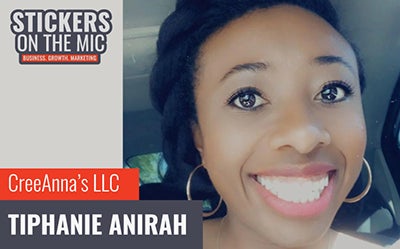

Tiphanie Anirah started CreeAnna's LLC during the COVID pandemic, selling cookies, muffins sweet breads and African meat pies. Now, her products are available at almost every event in Pocatello, Idaho. She started making food at home to share, and on the behest of her friends, she soon started sharing her food with more than just her inner circle. Tiphanie harnessed her passion for baking and started her brand by focusing on African Meat Pies, a flaky, pastry filled with meat, vegetables and African spices, as her flagship product. She added cookies, sweet breads, cakes and chin chin, which are small, fried, doughnutlike treats native to West Africa, to her menu. She used her middle name (CreeAnna) as inspiration for the business name and purpose. Now nearing her fourth year in business, she has plans to expand and grow the brand. Listen in to her how she got started and what's next.
You can also watch the episode on YouTube.
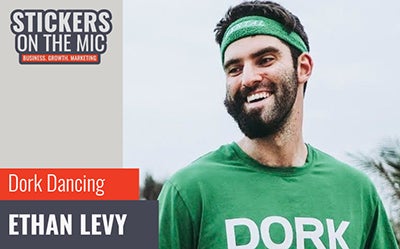

Ethan Levy is the founder and host of Dork Dancing. Ethan, diagnosed as bipolar, has been hospitalized twice for his episodes of mania. These experiences were life-changing, altering his perspective on life entirely. During the early days of the COVID-19 lockdown, Ethan reflected on his values, purpose, and story. He decided to fight for a cause, advocating for mental health through dance. Ethan is going out to the streets making a statement and helping others let loose. Ethan is on a mission to help others move well and break free from psychological barriers.
Dance holds tremendous power and Dork Dancing is helping more people tap into that power by letting loose. As a community, Dork Dancing is growing together while raising awareness for mental health. Dork Dancing is something that's visible, that's positive, and that can spread. Dork Dancing means dancing like dorks to do something good for mental health. Dork Dancing is also project of the Colorado Nonprofit Development Center, and StickerGiant is a sponsor of their stickers.
Ethan joined the show to talk about how the idea is growing and helping to bring about awareness for mental health.
You can also watch the episode on YouTube.
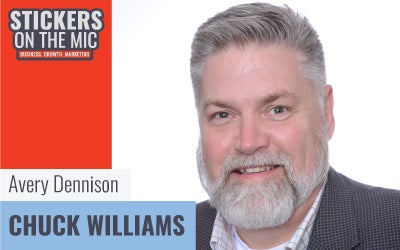

Chuck Williams From Avery Dennison Corporation Talks About Polymer Science, Sustainability & Labels
Chuck Williams is the Senior Director of R&D Global Platform at the Avery Dennison Corporation, and he joined the show for a special National Sticker Day episode where he talked about polymer science, sustainability and his path at Avery. He shared a few terrific stories, including his meeting with R. Stanton Avery, the founder of Avery Labels and the reason StickerGiant chose January 13th (his birthday) as the date for National Sticker Day.
In his thirty years at Avery, he's been able to work on development projects that have changed the way labels are produced, and how the label industry continues to evolve.
Listen in to learn more about how Avery is changing how labels and adhesive can bring the world together while also making it a better place.
You can also watch the episode on YouTube.
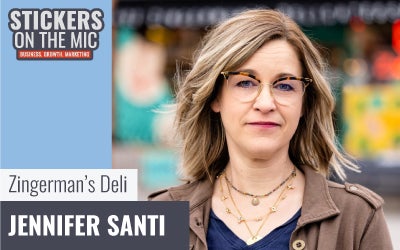

Jennifer Santi is the Marketing and Communications Manager at Zingerman's Deli.
Zingerman's is a community of eight food-related businesses all located in the Ann Arbor, MI area that has become an institution in itself. Their mission is to share the Zingerman’s experience selling food that makes people happy and giving service that makes people smile. Jennifer spoke on the podcast about Zingerman's iconic designs, local focus and community-oriented growth.
She shared how they bring the Zingerman’s Experience to as many people as possible by focusing on their 3 Bottom Lines (Great Food, Great Service, Great Finance) and about how their Guiding Principles shape how they work together, how they relate to each other, to their guests, to their suppliers, and to their community.
Listen in to learn more about how Zingerman's impacts the community in Ann Arbor and what's next for this growing group of businesses.
You can also watch the episode on YouTube.
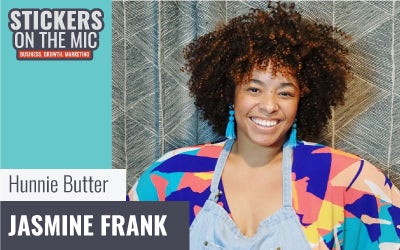

Hunnie Butter is a small family business owned and operated by husband and wife team, Jonathan & Jasmine. They are located in Mesa, AZ, but they are proud Los Angeles natives. They met 10 years ago at a bakery and they have been on the same team ever since. Their mission is to make incredible and beautiful, scratch-baked goods like layered cakes, cookies, bars, round cakes and caramels. Jasmine joined the show to talk about how she's growing her eCommerce brand while also creating a local business that offers Hunnie Butter baked goods and classes.
You can also watch the episode on YouTube.
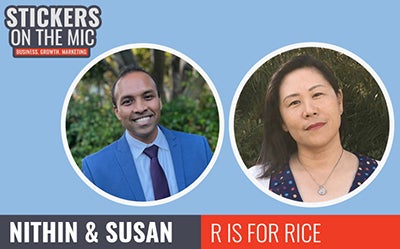

Nithin And Susan From R Is For Rice Talk Representation In Children's Literature And Self-Publishing
Nithin and Susan are two of the co-founders of JKL Teahouse, publishers of "R Is For Rice." They joined the show to talk about Asian American representation in children's literature and starting a self-publishing brand. As Asian Americans growing up in the U.S., they rarely saw themselves reflected in popular books and media. They created their first book, R is for Rice, to celebrate Asian cultures infused in daily American life. Their goal is to take readers on a journey through the alphabet with the ABC’s of Asian American foods. At JKL Teahouse, they are proud of their multiple Asian heritages, and they are proud to be Americans. Their mission is to inspire a broader definition of “American” by offering products that reflect Asian Americans and the impact of Asian communities on American life. They also spoke about starting their publishing and ecommerce brand, and how the creative process works in their business. Listen in to learn more about they are working to create a more inclusive world through kids books.
You can also watch the episode on YouTube.


Marisa Morrison is the color-loving, creativity-obsessed founder of The Neon Tea Party (TNTP). For as long as she remembers, she's made things: a “fashion line” at age 8, crystal bracelets at age 11, themed parties at age 14, a university magazine at age 19, and a lifestyle blog at 27. Now, in her 30s, Marisa aims to inspire others to tap into their own creativity by offering DIY tutorials, in-person workshops, virtual classes and more. When she’s not immersed in her latest crafting obsession or growing The Neon Tea Party from her colorful home office, you can find Marisa decorating her house, scrolling Pinterest for fresh project inspiration, or in the kitchen cooking. Marisa lives in New Jersey with her daughter Sofie, dog Kugel, and husband and TNTP Chief Hustle Officer Sam. Marisa spoke about how The Neon Tea Party is on a mission to empower people to celebrate their creativity through colorful, playful crafts. TNTP provides fun DIY tutorials, craft supplies, virtual classes, and even a virtual craft camp to help people make joyful items for themselves, their loved ones, and their surroundings.
You can also watch the episode on YouTube.
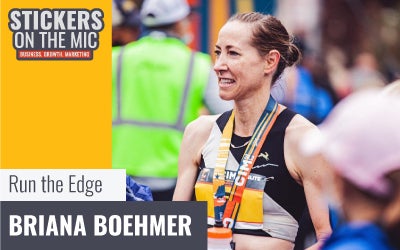

Briana Boehmer is the Chief Operating Officer at Run the Edge, a Boulder-based fitness platform that aims to make fitness fun, accessible, and integral to daily life. They inspire and include people all over the world with their devoted team, dynamic challenges, and community-first approach.
Briana ran collegiately for the University of Colorado and the University of Wisconsin, but now you'll find her standing atop the podium in multi-sport events. She’s completed 6 full Ironmans, including the World Championships in Kona, Hawaii.
She joined the show to talk about how they create gamified fitness experiences that challenge people to meet and exceed their goals. The platform at Run the Edge is a diverse set of virtual challenges that feature unique rewards and help foster community. There are seven different options that range from full-year challenges to monthly motivations.
Briana is a master organizer whose influence at Run The Edge is focused on ensuring everything they do centers on their mission “Everyone Included, Everyone Challenged, Everyone Successful.”
You can also watch the episode on YouTube.
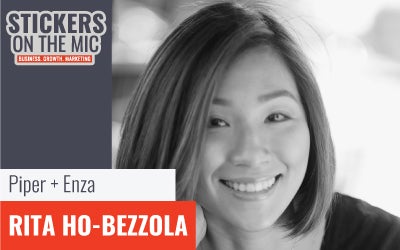

Rita Ho-Bezzola is an entrepreneur based in Los Angeles with an MBA from the UCLA Anderson School of Management.
As a mother of two, she strives to contribute to the well-being of the next generation in her future endeavors. Like millions of other parents around the world, the Covid pandemic turned Rita's life upside down. She started looking for resources that would support her in guiding her two young daughters through a strange and scary time. She was looking for any tool that could her help frame the conversation or give her the right words to say to make the situation easier for her kids to understand. This search brought with it a realization that for so many families, perhaps those with a sick child or parent, these conversations have to happen all the time. And because kids think about things so differently than we do, the words we use (and don’t use) matter when helping shape their perception.
Piper + Enza wants to help kids and their families center on the good when faced with challenges, and to focus on the light as they are moving through the tunnel. The mission at Piper + Enza, a health and happiness company, is to support children and their families with the inevitable bumps and bruises of growing up, shifting the narrative from a place of fear to one of healing, knowledge and celebration. Using books, tools, toys, and resources developed in collaboration with early childhood educators, child life experts, pediatricians, and child psychologists, we want to give families strategies to navigate through the fears and unknowns of growing up and instead, support them in embracing the journey.
You can also watch the episode on YouTube.
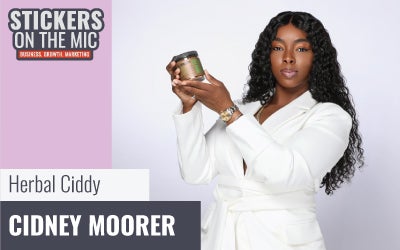

Cidney Moorer started Herbal Ciddy four years ago to create plant-based skincare products for all skin types. Her vision was to have an all-in-one selccare and holistic wellness line. She joined the show to talk about how she started Herbal Ciddy in 2019 after sixteen months of trial and error that included learning all there was to know about skin and botanical ingredients to help alleviate particular conditions. Cidney also spoke about how she scaled her brand and developed new products like petcare and wholesale options. Up next for her is a retail presence in the Beachwood Place Shopping Mall in Beachwood, OH. We also chatted about how she built a loyal consumer base for her products that led to a massive marketing boost in June of 2020 from one of the most-prolific influencers in the world: Beyonce. The cultural icon and her fashion stylist Zerina Akers included Herbal Ciddy in their “Black Parade Route” promotion that put a spotlight on Black-owned brands across the country.
You can also watch the episode on YouTube.
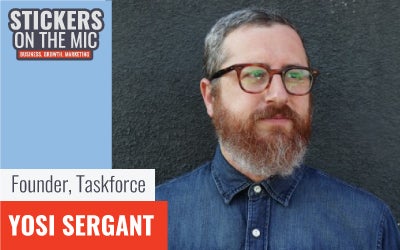

Yosi Sergant is a cultural strategist & movement entrepreneur who started TaskForce, an independent agency working at the intersection of arts, culture, and social change. He has spent his career investigating how intentionally designed cultural strategies can create new narratives, reshape cultural norms and spark lasting behavioral change. His mission is to champion the role of the artist in shaping culture, public opinion and public policy. Yosi is known for his role in commissioning and managing the Obama "Hope" poster created during the 2008 presidential election by Shepard Fairey. He spoke to us about how TaskForce is trying to help people and organizations build momentum to tackle our worlds toughest challenges. Listen in to learn more about how Yosi thinks digital art can create a new conversation around current events and cultural change.
You can also watch the episode on YouTube.
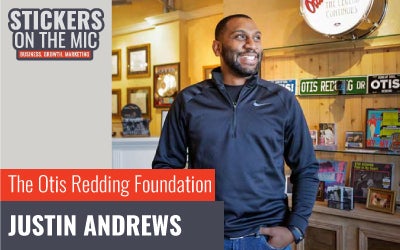

The mission of the Otis Redding Foundation is to empower, enrich, and motivate all young people through programs involving music, writing and instrumentation. Justin Andrews, Redding's grandson joined the show from Macon, Georgia, to talk about the philanthropic commitment of Otis Redding to empower and enlighten all young people to fulfill their dreams. They shared how the Otis Redding Center for the Arts is breaking ground on a new facility that will house the Otis Music Camp and many more events to serve the community in Macon. Listen in to hear how the Foundation is building on the legacy of Otis Redding and building a better future for kids through education.
You can also watch the episode on YouTube.
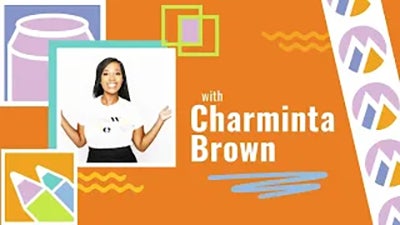

Charminta Brown is the founder and owner of Brown Joy, a brand that highlights the importance of representation, worthiness, and normalcy by featuring Black and Brown characters in everyday products, such as stickers and other products where Black and Brown people are not commonly seen.
Char has daughter named Joy, and as a mom, she always wants Joy to see herself in everything positive specifically in children’s products. For example, every time Charminta would take her daughter Joy to the Pediatrician, Dentist office, or business that gave children stickers, Joy would always receive stickers of animals or of characters that do not look like her. Charminta was exhausted from witnessing the lack of representation in sticker selection, so she decided to create Brown Joy where Black and Brown characters can be showcased in everyday items we love and enjoy.
You can also watch the episode on YouTube.
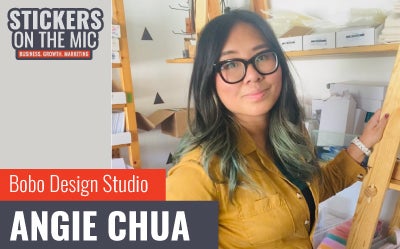

Angie Chua is the founder, heart, and soul of bobo design studio where she designs and creates wanderlust inspired stationery, stickers, and travel accessories. When she isn't in the studio, she can be found lounging at home in her 1975 restored Airstream, or hitting the road with her husband and two wiener dogs in their smaller retro trailer dubbed "The WIENERbago.
You can also watch the episode on YouTube.
Here are the podcasting services where you can find Stickers on the Mic.
Apple Podcasts | YouTube Music | Spotify
